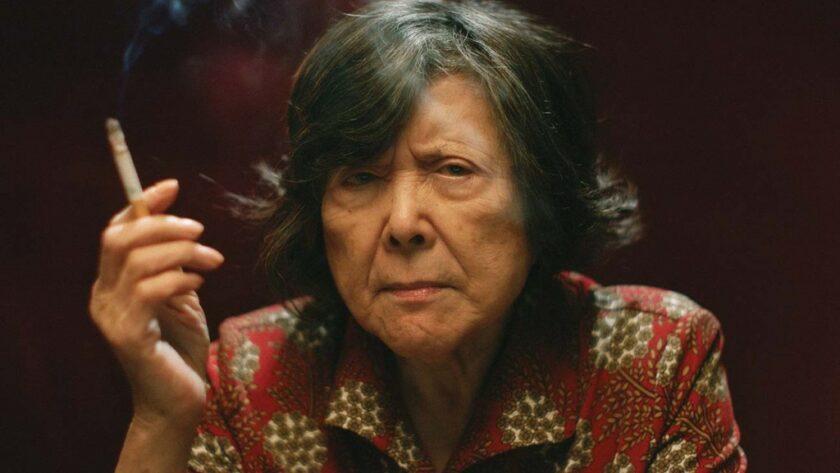KC Wingert reviews the buzzed-about dark comedy at LFF 2019.
With her debut feature Lucky Grandma, a film about an elderly Chinese-American woman with a rebellious streak, writer-director Sasie Sealy contributes equal parts humour and suspense to this year’s London Film Festival. Tsai Chin plays the titular role of Grandma Wong, a gruff, chain-smoking loner whose expressionless indifference and grumpy demeanour has led me to dub her the Clint Eastwood of Grandmas. Grandma Wong lives alone in the small, outdated Chinatown apartment she and her late husband once shared. Though her daily schedule is monotonous—practising tai chi, lighting incense for her in-home Buddhist altar, evading her adult son’s requests that she move in with him and his family—Grandma Wong receives a reinvigorating jolt of excitement while visiting a fortune teller, a sequence which visually references the opening tarot scene of Agnès Varda’s Cleo from 5 to 7. The fortune teller presents to Grandma Wong a series of cards written in Chinese script and tells the old woman that she will have an incredible amount of luck on October 28th (admittedly a very different fate than the one predicted for Cleo).
With fortune on her side, Grandma Wong empties her bank account on the 28th and hops on a Chinatown bus headed straight to the casino. At first, it seems like the stars really have aligned for her; she beats incredible odds and wins at craps and roulette so many times that her tokens double, then triple, and then quadruple. Her lucky streak comes to an end eventually, though, and she returns to the Chinatown bus downtrodden, having lost all her savings in one bet.
Grandma Wong’s good luck seems to take a different form, however, when money literally falls into her lap on the bus ride home. The man in the seat next to her suddenly dies of a heart attack while everyone else on the bus is asleep. When the bus hits a bump and a duffel bag filled with money falls from the luggage carriers overhead, Grandma Wong realises that her deceased seatmate is in fact a gang member transporting money for the Red Dragon gang. Already panicked about her casino losses, Grandma Wong absconds with the money, inadvertently placing herself at the centre of a violent gang conflict over the cash.
The strength of this film is not necessarily the narrative, which at times feels muddled and confusing amidst its portrayal of New York gang politics and reaches a hasty conclusion in its third act. Rather, Lucky Grandma’s greatest asset is its characters, all fully realized through the little details which make up each person’s unique and entertaining personality. Grandma Wong’s lanky grandson David, for example, may play a relatively small role in the film. However, in the approximately 10 total minutes of screen time he has, viewers learn that he is a one half of a dance duo, making goofy, low-quality hip-hop music videos in his grandmother’s apartment with his chubby, twerk-happy friend Nomi. This small, endearing personality detail raises the emotional stakes later in the film when the Red Dragons demand Grandma Wong pay a ransom to spare David’s life. The same goes for the character Big Pong (Hsiao-Yuan Ha), the man Grandma Wong hires as a bodyguard after dopey Red Dragon gangsters Pock-Mark (Woody Fu) and Little Handsome (Michael Tow) show up at her apartment. Big Pong first appears to be quiet and intimidating, but viewers will find a tender sweetness in his character when he talks about being a vegetarian, describes the girl he loves who still lives in China, and scolds Grandma Wong’s grumpy neighbour for disrespecting an elder.
The main figures in any film are only as strong as the actors who play them, and the cast of Lucky Grandma brings these characters to life with quirk and charm. As the socially isolated Grandma Wong, Tsai Chin is often the only actor onscreen. The character requires an actor who can subtly convey large emotions with her facial expressions and body language, and Tsai Chin is more than fit for the challenge. She brings laughs just by widening her eyes, furrowing her brow, or turning her head—no dialogue required. As gangster hitman Little Handsome, actor Michael Tow somehow manages to be simultaneously terrifying and hilarious, sending chills down one’s spine with his threatening stare one moment and highlighting his character’s sheer absurdity with a goofy smile in the next. The talent in this cast alone could dispel any excuses Hollywood may make for whitewashing Asian or Asian-American roles (I’m looking at you, Scarlett Johansson).
Though it is not a life-changing or particularly profound film, Lucky Grandma is sure to make viewers chuckle heartily, scoot to the edge of their seats in suspense, and stare in wonderment at each creatively-framed shot. The plot leaves room for confusion and questions, but the dramatic achievements of the cast alone are enough to make this film a success among audiences. The film deftly combines humorous and whimsical moments with darker undertones. Considering the film centres on the identity crisis of an elderly Chinese-American woman—a demographic I can safely say is sorely underrepresented in American film—Lucky Grandma is a breath of fresh air and a new perspective in the comedy genre.





